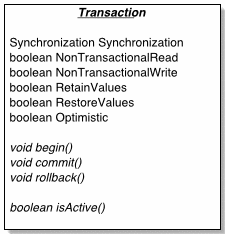
The Transaction interface controls transactions in JDO. This interface consists of "getter" and "setter" methods for several Java bean-style properties, standard transaction demarcation methods, and a method to test whether there is a transaction in progress.
The Transaction's NonTransactionalRead, NonTransactionalWrite, RetainValues, RestoreValues, and Optimistic properties mirror those presented in the section on PersistenceManagerFactory settings. The final Transaction property, Synchronization has not been covered yet. This property enables you to associate a javax.transaction.Synchronization instance with the Transaction. The Transaction will notify your Synchronization instance on transaction completion events, so that you can implement custom behavior on commit or rollback. See the javax.transaction.Synchronization Javadoc for details.
The begin, commit, and rollback methods demarcate transaction boundaries. The methods should be self-explanatory: begin starts a transaction, commit attempts to commit the transaction's changes to the data store, and rollback aborts the transaction, in which case the data store is "rolled back" to its previous state. JDO implementations will automatically roll back transactions if any fatal exception is thrown during the commit process. Otherwise, it is up to you to roll back the transaction to free its resources.
Finally, the isActive method returns true if the transaction is in progress (begin has been called more recently than commit or rollback), and false otherwise.
Example 9.1. Grouping Operations with Transactions
public void transferFunds (User from, User to, double amnt)
{
PersistenceManager pm = JDOHelper.getPersistenceManager (from);
Transaction trans = pm.currentTransaction ();
try
{
trans.begin ();
from.decrementAccount (amnt);
to.incrementAccount (amnt);
trans.commit ();
}
catch (JDOFatalException jfe)
{
throw jfe;
}
catch (RuntimeException re) // includes normal JDO exceptions
{
trans.rollback (); // or could attempt to fix error and retry
throw re;
}
}